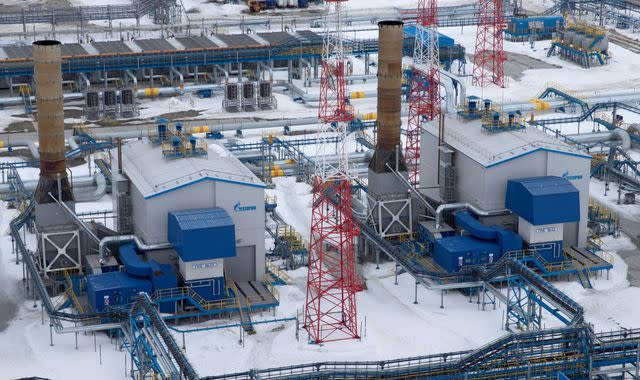New EU sanctions target Russian gas for the first time - but could have gone much further

The EU today launched its 14th package of sanctions against Russia - this time targeting Vladimir Putin's liquefied natural gas exports (LNG) for the first time.
The measure is the latest attempt by the bloc to deny Mr Putin's regime of money as his war on Ukraine drags into its 29th month.
No EU bans on Russian gas yet
The sanctions, which will kick in after a nine-month transition period, fall short of an outright ban on Russian LNG shipments.
This partly reflects the fact that EU members are themselves still allowed to buy LNG from Moscow - even though the bloc has set a target of phasing out Russian fossil fuels by 2027.
The EU followed the lead of the United States and the UK in banning Russian oil imports, with one or two limited exceptions, in 2022 after Russia attacked Ukraine.
What latest sanctions do
The key measure in the package, signed off late last week in the face of opposition from Germany and Hungary, is a ban on trans-shipments off EU ports of Russian LNG - essentially preventing the commodity from being sold to third countries via EU ports.
Part of the package also targets specific vessels - including an initial 27 oil tankers - that are used to get around the price cap slapped on Russian oil by the G7 countries.
It will also, in time, target vessels caught, for example, carrying ammunition from North Korea to Russia or transporting grain stolen from Ukraine by Moscow.
The latest package of sanctions also bans new investments and services to complete LNG projects under construction in Russia.
That should, in theory, stymie Russia's attempts to build out its LNG exports and grow market share.
Other elements include bans on EU businesses from using the Bank of Russia's system for transfer of financial messages (SPFS) system - the Bank of Russia's version of the West's Society for Worldwide Interbank Financial Telecommunication (SWIFT) inter-bank messaging system.
Under this measure, the European Council will be allowed to draw up a list of non-Russian third-country banks connected to the system and ban them from doing business with EU operators.
Targeting rich Russians and pop stars
There are also restrictions on access to Russian media, as well as new technological and export restrictions and a fresh blacklist of a further 116 people deemed to be supporting the war, including the singer Yaroslav Dronov, who performs under the name Shaman and whose song 'I'm Russian' was reportedly played daily to Alexei Navalny, the late democracy campaigner, in his Arctic Circle prison cell.
Also targeted was another popular Russian singer, Polina Gagarina, who performed before Putin at an event in Crimea following the invasion of Ukraine.
The EU has also introduced a number of bans, targeting wealthy Russians, on private jet travel to EU resorts.
Read more: One year on from Wagner rebellion Putin is as strong as ever
Announcing the measures, the European Commission said: "As the Russian aggression against Ukraine continues, the EU remains determined to keep acting to further reduce Russia's sources of revenue and capacity to wage war.
"Today's measures send a clear and strong signal of EU unity and of our support to Ukraine and its people."
Will watered-down sanctions have any impact?
The big question is whether these latest sanctions will actually have much impact - particularly in view of the fact that they were watered down.
Germany, for example, reportedly prevented a widening of measures that would have forced EU companies to guarantee that their customers would not be able to sell prohibited goods to Russia.
And Hungary - the value of whose Russian LNG imports is up 59% year on year - is said to have demanded assurances that no current or future measures will impact the Paks II nuclear power plant which is being built by the state-owned Russian power company Rosatom 63 miles to the south-west of Budapest.
The chances are that the sanctions will only go so far in hurting Russia.
Still a major supplier
According to Kpler, the data provider, Russia is the second-biggest supplier of LNG to the EU after the United States. It says that, so far this year, the US has met 41% of the EU's LNG needs and Russia 21%.
And in May this year, for the first time since just after the invasion of Ukraine in February 2022, imports of Russian LNG were greater than those of American LNG.
Nor do these sanctions cover imports of Russian gas transported to the EU through pipelines via Turkey and Ukraine itself.
Much of this ends up in central European countries such as Austria, which in the first five months of this year had 80% of its gas needs met by Russia, but also countries such as Italy and Belgium.
Moreover, while the bans on trans-shipments will make it harder for Russian LNG exports to reach their intended destination, they are unlikely to stop them altogether.
They will just force Russia to use longer shipping routes - while a lot of the LNG previously being exported in this way is now, ironically, likely to be sold to customers in Europe itself.
It is always encouraging to see the EU seeking to deprive Putin's war machine of money.
But these sanctions could have gone a lot further. That they did not highlights the extent to which the EU still relies on Russian gas.

 Yahoo News
Yahoo News 
